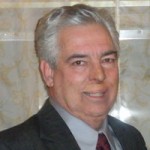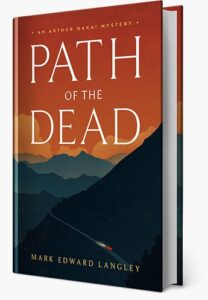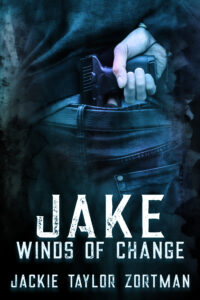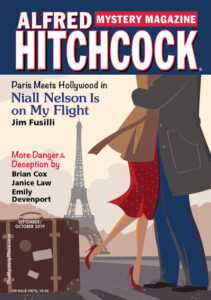President’s Message

It’s hard to believe it’s already been two months since the 2019 PSWA Writers Conference in Las Vegas. Time sure flies. Thinking back on the conference, I have to say I had the best time. From the Thursday Meet and Greet to the Sunday Awards Banquet, I was inspired and challenged by the old and new friends I met. Any conversation could be started with, “What are you working on?” and the networking and connections exploded from there. The presentations were excellent, even when disturbed by a fire alarm that those of us in the fire service felt we should be doing something about instead of just sitting there waiting for further instructions. The panels presented such great information from field expertise to craft advice. I know I’ve said it before, but I have to say it again. The PSWA has the best members! Along with the networking and writing information gained, the fun and friendly attendees make people come back year after year. Like our own Marilyn Meredith says-It’s like a family reunion. Thank you to all the board members who handled the operations and logistics to make this year another smashing success, especially Mike Black, our Conference Chair.
Speaking of board members, you might know that the PSWA has a voluntary board of directors. Each person donates their time to make sure all the areas of the association run smoothly. From the contest to membership, newsletter to conference, technology to facilitating the whole thing, board members keep things moving along. All the work is done remotely from wherever they call home, except for the twice a year in-person get-togethers. Once, directly after the conference ends on Sunday afternoon, and once in the late winter.
This year, several of our current board members are stepping down, myself included. This is not a bad thing!! Tim has decided it’s time to pass the torch so he can spend more time on the home front. Thonie and I are both exploring amazing new opportunities that will require a lot of our time and energy. I’ll let Thonie speak for herself, bur for me, I started my Master’s of Social Work program at Arizona State University last month. Only a few weeks in, I’m already looking forward to the day when I can read and write things again that aren’t directly related to school. It’s like language immersion; I’m beginning to see my whole world through social work terminology, policies and procedures. What this means for all of our members is there will be some movement and openings on the board. John Schembra, our current VP is going to step into the President role and several other members who have expressed interest in getting more involved have been contacted. If you want to be considered for a position on the board, let us know. This will be an exciting time of change for the PSWA but I believe keeping things fresh and diverse on the leadership level makes for a better organization.
I’ll sign off for now, but rest assured I will still be around. I may be crushed under text books, but I’ll be here. Back to all the great things that took place at the conference. If you haven’t done so already, don’t delay a minute more. Reach out to those who you networked with. Email that publisher, send your WIP to the other member who offered a critique and get in touch with that officer, dispatcher, fire fighter, medic, medical examiner, etc who has an answer to your procedural question. Don’t forget to use the listserv to keep in contact with everyone. Until we see each other again, happy writing.
—Michelle J.G. Perin-Callahan, MS, QMHP, EMT, and PSWA President
Visit me at www.thewritinghand.net or www.forgottenfirstresponders.com
Vice-President’s Message

The 19th century British Statesman and Prime Minister Benjamin Disraeli was quoted as saying “Change is inevitable. Change is constant.” No truer words have been spoken.
As you all are aware, in August we had three board members tender their resignations—President Michelle Perin-Callahan, Secretary and Alpha Geek Tim Dees, and Member at Large Thonie Hevron.
Their decisions were not made lightly, and their reasons are understandable. We will miss them, and the great contributions they made to the PSWA. I, personally will miss my friends, and hope they will stay a part of the PSWA as members.
We were faced with a void in the Board that needed filling. We have acted swiftly to fill that void.
I have been nominated to succeed Michelle as President. Scott Decker has been nominated to the now vacant Vice President/Membership Chair position, and Bob Calkins has been asked, and agreed, to become the new Secretary. In addition, Barbara Hodges has consented to become the chair for the writing contest. These nominations will become “official” at the February mid-year Board meeting.
Having identified candidates for the most urgent positions, there are other tasks that we will be asking volunteers within our membership to help with. We have every confidence our fine membership will step-up to assist the Board and with some of the day-to-day tasks and the conference planning.
Once we have definitively identified those needs we will put out the call for help.
We do not do this lightly. With an eye on the future, we hope to find members who would be a good fit for the Board at a later date. As we have found, change can occur at a moment’s notice, sometimes without warning, so we need to be prepared.
As I have said many times, the PSWA is the finest group of writers anywhere. The talent, expertise, and willingness to help among our membership is amazing. Oh, and don’t forget the conference—without a doubt the absolute best of many other conferences I have attended over the years.
So, rest assured that the Board is working to seamlessly to continue our record of excellence, and with the new Board members, and some help from the membership, we will be successful in achieving that goal.
Onward and upward!
—John Schembra, PSWA Vice-President
Another One for the Record Books

Well, I’m sitting here watching the fading last days of summer and recalling the great time that was had by all at this past summer’s 14th annual PSWA Conference. For those of you who missed it, I genuinely feel sorry for you. It was described as the best one yet, and since I was the program chair, I have to agree with this.
All joking aside, it was a fabulous time in Vegas. We started thing off with our writer’s workshop, which had a record number of attendees this time. The writing topics were mostly centered on writing short stories due to the PSWA plan to possibly do another anthology. The three instructors, Mysti Berry, Marilyn Meredith, and me, all taught a segment and did critiques on earlier submissions as well. As the workshop reached the final phase, I stepped out into the hall and began the conference check-in procedure. Name tags were given out along with our great new conference bags. I must say that these new bags were some of the most beautiful I’ve ever seen given out at a writer’s conference. The check-in ended and the evening get-together began. The food was out of this world at this one, and I must say, I ate so much of it that I didn’t need dinner. It was great to reconnect with old friends and make some new acquaintances.
And speaking of new acquaintances, this conference had a large number of first time attendees. I hope to see many of these faces again next year. Our Friday started with opening remarks by our PSWA President, Michelle Perin Callahan, and then got off to a fast start with our Vice President, John Schembra, doing a presentation about high speed police driving. That one ended with a remarkable video featuring an actual police pursuit that was so harrowing that I found myself reaching for a non-existent seatbelt on my chair.
The panels began, covering such topics as science vs. mysticism and writing short stories for anthologies, and was then followed by the first day’s wonderful lunch. Things then segued into our second presentation by our PSWA Treasurer, Mysti Berry, on the dramatic question and how to utilize your personal experiences in writing both fiction and nonfiction. Incidentally, Mysti’s new short story, “My Yorkshire Ripper,” is in the newest issue (September/October 2019) of Alfred Hitchcock’s Mystery Magazine, which is quite a milestone.
This was followed by more topics on the subjects of media promotions, the testosterone-laden tough guys and PI’s panel, and finally one about the harrowing role of emergency dispatchers. This last one had four individuals who’d worked in communications and the perspective they provided was eye-opening.
We then called it a day’s wrap except for the stalwart individuals who volunteered to participate in the old-time radio play. We had the auditions, held the rehearsal, and then broke for the night for a late dinner.
Day two began bright and early on Saturday morning with former Irvine, California Deputy Chief Dave Freedland’s presentation on SWAT Concepts for the Patrol Officer. Dave had a great PowerPoint presentation that had actual scenarios from his days as a SWAT officer and later a commander of operations. A false fire alarm sounded midway through his presentation, and continued to buzz and flash for several minutes. Undaunted, Dave managed to complete his presentation with the aplomb of the true professional that he is. It just goes to show that a good SWAT commander is able to adapt to whatever unforeseen event that arises.
Our publisher’s panel came next, with several publishers on stage answering questions. There were Austin Camacho and his lovely wife, Denise Camacho, from Intrigue Press, our good friend Geno Munari (Houdini Press), newcomer Jo Wilkens (Mystic Publishing), and Rick Ollerman, who’s an editor for Down and Out Publishing. It was informative and fun. The publishers then went to various points in the room to listen to pitches from the conference attendees and answer questions about their respective publishing companies. Another magnificent lunch followed.
Doing a presentation after lunch always presents a problem, and this year that duty unexpectedly fell to me when one of our scheduled presenters was unable to attend due to a family issue. Luckily, I had one of my lectures from my creative writing class ready and waiting in the wings, and spent the next forty-five minutes talking about the difference between showing and telling in writing. Nobody threw any rotten tomatoes at me, but I’d earlier pulled the luncheon staff aside and told them not to serve any just in case.
We then had more panels on the editor and author relationship, writing historical fiction, and writing action scenes. This finished out the panels for the day and it was time for the old-time radio play, The Adventure of the Smoking Informant. The play was written by Mysti Berry and me and afforded plenty of laughs, including a few unscripted ones. Afterward, Pete Klismet hosted the informal Newcomer’s Dinner.
Things continued to rock and roll Sunday morning as we had our final rounds of panels on gathering evidence, handling large scale disturbances, and perfecting your writing skills. These were followed by our annual Writing Contest Awards. At the conclusion, everyone departed with the assurance that the conference had been a complete success. The vast majority of the conference evaluations reflected this as well.
The PSWA board members met afterward as we cleaned up and dismantled our equipment. These post conference meetings are always a challenge because it’s like giving a press conference after completing marathon. Exhaustion reigns.
Later, as I waited in the late afternoon heat with fellow board member, Tim Dees, for Ron Corbin to arrive with his pickup truck to take the PSWA equipment to his house for storage, the feeling was, as always, bittersweet. Sweet because it had been such a wonderful experience filled with so many good times … Bitter because it had come to an end for this year.
But as they used to say at the end of those James Bond movies, Bond will be back. So will the PSWA. I hope to see you all next year.
—Michael A. Black, PSWA Conference Chair
Are You Ready for the 2020 Conference?

It feels like we just unpacked our bags and started working through all the great ideas from the 2019 conference at the Orleans Hotel & Casino in Las Vegas in July. However, 2020 Conference planning is underway! We read your evaluations and have been working hard to create an even better conference than this year’s.
You can register early and grab an early bird discount—AND you can always get an extra discount for selecting the No Refund option.
Michael A. Black is hard at work on lining up solo presenters, we’re planning the writer’s workshop, next year’s writers competition, and much, much more.
Grab your seat today: https://policewriter.com/conference-registration-fees/ (review the options and then click the registration form link at the bottom of the page).
We’ll update the competition and other pages as 2020 information becomes available.
—Mysti Berry, PSWA Treasurer
Stay Aware, Stay Safe
The art of knowing what’s happening around you and using that knowledge to protect yourself and your colleagues.

As we’ve seen in New York City recently, being a police officer has become more dangerous than ever. Officers responding to calls for help and arresting lawbreakers have been subject to verbal and physical assaults. There are myriad reasons why this latest outbreak of disrespect and lawlessness is occurring, not the least of which is that many city administrations punish cops that respond to the assaults, rather than the thugs that commit the acts. In private conversations, some officers admit to dialing down their activity, hardly doing any proactive policing and responding to radio assignments slowly and reluctantly.
That aside, let’s review how to stay safe in your role as a police officer. Situational awareness is even more imperative in the current climate. Knowing what’s happening in your environment will help keep you safe and healthy. But being aware of everything around you has become more difficult than ever. Keeping focused on an offender(s) is paramount, however, in certain areas crowds form quickly and threats from them become almost certain. Add into the equation technologies such as radios, cell phones, and laptops, items that were supposed to help a cop do his job better but that might just cause his attention to them to be the very thing that gets him hurt.
Injuries
We’ve seen objects being thrown at officers while they’re engaged with an offender or using their radios or laptops. Their attention is drawn away from their environment temporarily, and that’s when the likelihood of being injured is great. This isn’t hyperbole. Last year, the National Institute of Occupational Safety and Health published a report relating to non-fatal injuries suffered by police officers between 2003 and 2014. Cops are three times more likely to be injured on the job than all other U.S. workers. The study found that more than 669,000 officers were treated in ERs, the leading cause being assaults and violent acts.
Being Aware
Being aware of your situation and environment is the key to staying safe. It’s difficult to be totally aware when one is involved in a high-stress situation such as an arrest, street stop, or traffic stop. But some things can help you dial into your situation quickly.
Identify threats: Quickly gauge the most likely threats around you, whether they are people or objects. If you’re familiar with a certain gang area, i.e., realize that it’s likely members will harass or attack you. Traffic stops or street stops near high-rises may result in objects being thrown at you. Abandoned buildings pose hidden threats, as do debris and garbage in the streets. Such things become potential missiles.
Trust you gut: Learn from past experiences. When you’ve been in similar circumstances, remember the outcome and threats that presented themselves to you. If you have a bad feeling about something, pay attention because your mind is trying to steer you in the right direction.
Constantly check your 6: Common sense, right? But when you’re involved in a stressful situation and focused on something, that’s when it’s important to watch your back. It’s tough to take your eyes off what’s happening even for a second, but it just may save your life. Scanning and using your peripheral vision will help. If you can, try to back up against a tree or building to at least minimize any attacks from behind. Also, use any reflective surfaces in the area, such as car windows, storefronts, etc.
Constantly assess the situation: Sometimes there is a tendency to wait until it’s too late to get help. You must constantly assess what’s going on and realize when a situation is likely to accelerate and explode. Don’t be reluctant to get others on scene quickly. For that matter, if something escalates immediately before help arrives, don’t hesitate to retreat and regroup. Even if you’re about to arrest a subject and things begin to go south, it’s likely you’ll run into the same thug again sometime in the future. Let him go.
Training
Training can help officers adjust to situations they encounter. High stress situations such as active shooters, felony traffic stops, etc., can be addressed through force on force or simulators. The advantage to this type of training is that immediate feedback is helpful, and the training scenario can be run again correctly to reinforce the proper response. Scenarios can be specific to the department or agency to create even more realism.
Even the Army now recognizes the importance of training for situational awareness. The U.S. Army Maneuver Center of Excellence (MCoE) is addressing this need with a unique course called Advanced Situational Awareness (ASA). The course teaches soldiers the art and science of observing humans and their surrounding environment. The ASA course grew from the recognition that soldiers needed more training to enhance their awareness, sharpen their mindset, and increase their ability to secure themselves and their units in the complex environments in foreign countries as well as on the home front.
Training for situational awareness is paramount for our modern warriors, enabling them to predict threats and act decisively and accordingly. Violence is on the rise on our streets and it’s imperative that we are prepared to deal with it.
Stay Safe, Brothers and Sisters!
—John M. Wills, PSWA Member
9-1-1…What’s Your Emergency?

I grew up in a small Kansas farming community during the late 40s and early 50s (Geez, that seems such a long time ago, especially when you say it was the last century).
There was only one phone per household, and it was the type that is sold for a lot of money today in antique stores if they can be found at all. It was the kind that was mostly made of wood and mounted to the wall. A receiver hung on the side and a mouthpiece on the front. To use it, one had to lift the receiver and place it to their ear, turn a crank handle on the opposite side, and wait for the operator located in a small room down on Main Street to answer.
There were no phone numbers assigned to residents, so we just told Velma Brown (the operator) to connect us with whomever we wanted to call. She would plug in wires to the switchboard; the kind you see on the History Channel. Some phones were even on a “party line” system, which provided your personal business to those listening in on the common party line, which quickly spread as gossip. (aka typical “small-town news service.”)
There were no police or medical services, only a volunteer fire department. And if that service was needed, Velma would flip a switch that activated a siren on the town’s water tower. A certain wailing signal of the siren (different from the tornado warning) would alert volunteer firemen. Men from all areas of the town’s one square mile incorporated city limits would leave their homes, businesses, and even teaching classes in high school to rush down to the one fire truck parked at the station, with the fire chief stopping by Velma’s office to get the location of need.
Boy have we come a long way. Now, 9-1-1 is used all over the U.S. and Canada to beckon fire, police, and medical emergency response. Most everyone above the age of five knows this number and how to dial it in case of emergency. Many parents and early childhood education teachers make this a priority for children. Can you remember when all this came about? A brief history lesson.
In November 1967, the FCC met with the American Telephone and Telegraph Company (AT&T) to find a means of establishing a universal emergency number that could be implemented quickly. In 1968, AT&T announced that it would establish the digits 9-1-1 (nine-one-one) as the emergency code throughout the United States. On February 16, 1968, Alabama Senator Rankin Fite made the first 9-1-1 call in the United States in Haleyville, Alabama.
If you are curious about more of the history of the 9-1-1 system, go to:
https://www.nena.org/page/911overviewfacts
Texting 9-1-1
As I began writing this article, a couple of questions came to mind. First, since most everyone today has a cell phone, can you text 9-1-1? The answer … maybe. It depends on the location.
“The FCC encourages emergency call centers to begin accepting texts as text providers develop text-to-911 capability, but it is up to each call center to decide the particular method in which to implement and deploy text-to-911 technology.”
For additional information on this capability, or to find whether your local call center has a text capability, go to:
https://www.fcc.gov/consumers/guides/what-you-need-know-about-text-911
Foreign Travel Emergency Calls
Secondly, what about 9-1-1 in foreign countries? Is that the number to use? My wife and I travel frequently to other countries. And you know how Grandmas are. She always takes her cell phone even when traveling abroad, just to occasionally check-in or in case one of our family members needs us. Fortunately, we have never needed to call the emergency number when in another country. However, it is something I check in my pre-travel planning.
Like the U.S., most countries use either a 2-digit or 3-digit number for dialing emergencies. Some countries use different numbers for police, fire, or medical response. A good safety preparedness habit I try to use is to program our cell phones on speed dial with the appropriate emergency numbers before leaving home. Also, remember to let your phone provider know of your travel plans out of the country. They can help you in making your phone capable of international dialing.
This website lists emergency numbers for other countries:
Until the next time … Stay Safe!
—Ron Corbin, PSWA Member
Better Policing

For many years police departments across the country have been searching for ways to better police individual communities. One concept was called Community Policing. The idea was to work more closely with individual communities. The idea became listening to complaints, offering security measures and expecting people within the community to report criminals. The concept initially seemed like a good idea, but the citizen complaints and the lack of the police to respond to those complaints only caused more friction between the police and the community.
My previous partner, in my opinion, was an expert on community policing. He emphasized communication between the police and the community. He pledged to make the community safer for the citizens and the police. Every residential street within his beat or Public Service Area (PSA) had a designated citizen block captain and using a phone list or computer could quickly notify people on his or her street of various crimes that were taking place. Burglaries, robberies, assaults, restraining orders, warrants and or arrests that took place on the PSA streets were reported. Each officer working that PSA was introduced at monthly meetings. Officers were encouraged to engage with citizens, giving them their business card and in some incidences their cellphone number. Citizens were asked to report street or alley light outages, traffic signs that needed repair or replacement or damaged or broken sidewalks or roadways to the block captains. These reports would be forwarded to the various city government agencies responsible for fixing these problems. If the problem wasn’t repaired within a week, it would be reported again and every week after that until it was repaired. This got the citizens within that PSA in the habit of making notifications about their communities.
It was also suggested and encouraged that members of the community recognize officers making arrests for violent crimes within the PSA. This had a twofold benefit. One, officers felt if they made a legitimate arrest of a violent criminal in that PSA they would get a commendation that would go into their personnel file. It also encouraged a closer scrutiny of crime and showed the officer that the community cared about what he or she was doing. This would include officers making arrests within the PSA that were not assigned to that PSA.
An example of how this works is as follows. A series of burglaries had been taking place in a wide area of the city, one in the adjacent PSA. The block captains were notified and given a description of the suspect, if any, or a suspected vehicle. The MOD of the burglar, including what suspected tools he used. How the burglar entered the houses and what time of day or night these crimes occurred. Block captains would then pass this info on to everyone within his or her phone or computer pool, with suggestions to report anyone they deemed suspicious. Block captains would also ask residents to inform him or her when citizens within their neighborhood were going out of town so neighbors and police could keep a closer look on the property. Citizens were encouraged to make a list of their valuables and with electronics, stereos, computers, televisions, etc., to include a description, scratches or damages and, of course, serial numbers.
With an organized community and a willingness of officers to participate, crime could be reduced significantly. Citizens who were afraid to speak out individually could now speak out as a community. Police officers could, hopefully, get away from a “them vs us” mentality and realize we’re all in this together.
—Joseph B Haggerty Sr., PSWA Member
Life Balance: Myth or Reality for First Responders?

Picture this: My husband, Steve and I, along with several friends are in the Sierra mountains, sitting around a campfire telling stories. (There may have been a little beer involved). As they have every other backpacking trip, the group asked Steve, who is originally from Iowa, to tell his favorite story. He starts in.
“A traveling salesman, trying to get to Des Moines before dark, stops at a farmhouse to ask directions. The farmer’s wife introduces him to her husband who is out in the back, slopping the hogs. As the salesman approaches the farmer, he notices one of the hogs has a wooden leg.
“I’d be pleased,” he says, “If you would tell me how to get to Des Moines. But before you do, would you tell me how that hog got a wooden leg.”
“That’s a real special hog,” the farmer says. “Last year, I was out plowing, the ground was soft and the tractor rolled, pinning me underneath. That hog came running, shoved his way under the tractor and lifted if off me. Saved my life.”
“Is that when the hog got the wooden leg?”
“No sir. About six months ago we had a tornado. My wife and I ran for the cellar. I thought she had the baby, she thought I did. That hog grabbed the baby off the porch, held him in its mouth and dragged him out of harm’s way. Stayed with him until the tornado passed.”
The salesman looks at his watch. It is getting dark and he’s getting impatient.
“So, is that when the hog got the wooden leg?”
“No, sir,” the farmer says. “A hog that special, you don’t want to eat all at once.”
Groans, laughter, more beer.
In my years as a public safety psychologist, I’ve seen what happened to that hog happen to too many law enforcement officers (LEOs) and other first responders like firefighters and dispatchers. You give your all and when it comes time to retire, you are wounded and missing essential parts of yourself. The very parts you need to engage with family, friends and the civilian world. Qualities like empathy, trust, kindness, optimism, humility, humor (not sarcasm), openness, and the ability to ask for help and show vulnerability to the people you love.
That hog was loyal beyond belief. Loyalty to the group is a proud tradition in law enforcement. No question, it is a fine concept and a great quality to have, but only when applied wisely in the right places.
I’ve repeatedly asserted that many people choose to become first responders because they are attracted to the idea of belonging to a “big blue family” that promises to watch their backs. But belonging is not the same as fitting in. In many situations, you have to prove yourself to fit in. Not once, but over and over. Fitting in means you follow the rules and suppress differences. Belonging means you are accepted for who you are.
(This does NOT mean I think cops can choose how to do their jobs, disregard the law, or wear polka dot uniforms if they want to. I mean that individual variations in temperament, thought, cultural norms, values, and so on are treated with respect).
That poor hog sacrificed way too much—and for what? To be the centerpiece of the farmer’s holiday dinner? Caring for others without caring for yourself equals self-sacrifice, a noble concept that becomes meaningless when used without boundaries. Caring for yourself without caring for others results in selfishness or self-centeredness. The challenge is to construct a middle way where you can fulfill your obligations to your job without damaging yourself or the people you love.
Manny Ochoa, the fictional ICAC investigator in my third mystery, The Fifth Reflection, was so overcommitted to finding a missing child that he neglected his own baby and almost lost his marriage. Finding the middle ground is not easy. It involves knowing yourself, your priorities and your limits. It requires learning to push back against pressure from your peers or your culture to conform to values or behaviors that run against the grain of who you are, who you were, or who you want to be.
In my experience, looking for personal confirmation from the work-place is often a no-win deal. Why? Because organizations exist for their own survival, not your well-being. There are good people in organizations, plenty of them. Find out who they are. Avoid the people who think they know how you should live your life and that you should never show your humanity, have needs or set limits because that means you are weak.
I’ve said this before. First responders have two families, their work family and their real family. This is both a burden and a blessing. If you treat your real family with as much loyalty and respect as you do your work family, they should be there for you when you retire, when you get injured, or (this happens too often) when your organization throws you under the bus. Choose your real family first, but prepare for pushback when you do. If you are just now looking for a job, try to find an agency that has family friendly policies and a tolerant culture that respects individual and family needs. If you’re already working, examine your priorities, talk with your family, ask them if they feel they are playing second fiddle to your job and what you can do about it.
Don’t be like that poor hog. Be realistic about your situation. Look for what is possible, not what you hope for or believe you deserve. (You probably do deserve better, but that doesn’t mean you’ll get it). Plan ahead. This is enlightened self-interest. What happened to that hog could happen to you. And you’re the only one who can prevent it.
—Ellen Kirschman, PSWA Member
Promotion, from My Point of View

Unless you’re a big-name author, the majority of the promotion of the book you’ve written is up to you.
Over the years, I’ve done many events and used the Internet and social media to promote my books. I have a new book out this month, the latest in the Rocky Bluff P.D. mystery series, Bones in the Attic. It focuses on the discovery of a skeleton in an attic.

Buy link: https://tinyurl.com/yxpd8mxy
Of course there are book events that I do every year, and this one is no different—a big book fair, having a table at a local art fair, participating in a holiday boutique in a local art gallery. A couple of new opportunities have shown up, too, a local authors day at the museum in my town, and another at the library in the next city.
We don’t have any bookstore nearby so I always have to find other venues for signings. I’ve done them in coffee shops, thrift stores, at wine tastings, gift shops, and my favorite is a local chocolate store.
As for online promotion, I use Facebook a lot, including groups like our own PSWA group.
I’m getting ready to do a blog tour starting in mid-October. This is where I visit different blogs and write about different topics. Of course it has to be advertised to make it successful. I have my own blog where I write about what ever pops into my mind and I host other authors and do book reviews. https://marilynmeredith.blogspot.com and I’m on two other blogs on a regular basis, Make Mine Mystery and Ladies of Mystery. I use Twitter occasionally, but not near as much as I should.
I have a newsletter that goes out once a month. It’s fun because some of the recipients treat it like a personal letter and write back to me. Yes, it has news about my books, but I also write about what’s going on in my life.
On my car, I have a magnet with the cover of my latest book And I always have new cards for each book the cover on the front and information on the back. I get both from Vistaprint.com.
Of course I have a website too: http://fictionforyou.com
I hope this will give you ideas for promoting your book, and if you do some different things, please write an article to share with all of us.
—Marilyn Meredith, PSWA Newsletter Chair
Is Somebody Following Me?

Crime-writers (and moviegoers) are attuned to that staple of adrenalin-pumping action, the car chase. It doesn’t matter whether the pursuit is from the perspective of the follower or the followee—“That red car’s been behind me since Cleveland!”—they can be fun to write and nerve-wracking to read or watch.
Alas, chases that are little more than special effects demo reels (thanks, Hollywood), bear little relationship to how actual people would behave and strain readers’ credulity. If your characters are ordinary citizens, they’re unlikely to notice they’re being followed in the first place. If they do notice, they won’t know what to do about it. You have to find the sweet spot between over-the-top demolition-derby mayhem and dull cluelessness.
This renodadsblog post, written by two former CIA operatives, gives some tips on how non-professionals can detect surveillance. It’s basic stuff, but if you’ve been on a steady diet of The Fast and the Furious franchise or reruns of The French Connection, and you want to get back in touch with the reactions of the typical American distracted driver, here you go!
Story characters can be followed on-foot too, of course. The Art of Manliness guide on What to Do If You’re Being Followed gives common-sense advice on detecting and eluding people following you—assuming they are everyday muggers and not trained espionage agents, of course.
It all starts with being aware of your surroundings and policing your social media, two tactics your characters may—or may not—follow. Is there some reason your character is hyper-aware? Characters make mistakes (aren’t they fun?) but they also are resourceful.
—Vicki Weisfeld, PSWA Member
Twitter: @vsk8s
Website: www.vweisfeld.com
Member News
From Mark Edward Langley
Since meeting Craig Johnson a few years back, he has been a great supporter of my work. He even did the first blurb for my debut novel, Path of the Dead, and tweeted it on his Twitter page.

“Combining the gait of a fine horse, the comfort of your favorite Indian blanket, and the ease of a well-worn saddle, Mark Langley’s Path of the Dead is one heck of a debut novel coming out of the gate.”
—Craig Johnson, author of the Walt Longmire Mysteries, the basis for the Netflix drama Longmire
I was also lucky enough to meet and speak with British author Peter Lovesey in NYC during Edgar Week a few years back and he has agreed to do a blurb for the 2nd book of my series Death Waits in the Dark.
Since being published in August of 2018, my life has taken a new and welcomed direction. As all writers know, we work long hours trying to perfect our stories in hopes of one day grabbing onto the brass ring and hanging on for the ride of our lives! Well, I’m hanging on for dear life and seeing where this part of my journey will take me.
Ever since my first book signing event at one of my favorite independent bookstores, Anderson’s Bookshop in LaGrange, Illinois, I believe I have gotten so much better at being in front of people and talking about myself and my work. I was also lucky enough to be interviewed by Chicago author Libby Fischer Hellmann who made it so easy for me. After that I did an event at Barnes & Noble in Mishawaka, Indiana and then several library events for the Elkhart, LaGrange and Middlebury, Indiana libraries.
In fact, I have just concluded signing events at Barnes & Noble in Valparaiso, Indiana; the fabled Centuries & Sleuths in Forest Park, Illinois; Bookies Bookstore in Homewood, Illinois; a local fair in Schererville, Indiana and ended my paperback release tour at Barnes & Noble’s flagship store in Orland Park, Illinois. I am also overwhelmed that Path of the Dead has garnered both 4 and 5 star reviews on Amazon.com and has been reviewed favorably by several people and bloggers as well as Midwest Book Review and Western Writers of America. I am ready for what may be to come and look forward to the experience of a lifetime!
Ellen Kirschman
Ellen Kirschman reports she has two short stories in forthcoming anthologies: “Welcome to the Sisterhood in Shattering Glass” by Nasty Woman Press and “The Almost Sisters in Jewish Noir”, V.2. Both scheduled for 2020.
Marcia Rosen
Marcia Rosen has a new book being published by Level Best Books, November 5th. The Gourmet Gangster: Mysteries and Menus by The Family. Her son, Jory Rosen, wrote the recipes.
She’ll be doing book signings on Saturday, 4pm, November 23rd at Napa BookMine, Napa, California and on Sunday, December 1, 1pm, River House Books, Carmel, California.
Praise for The Gourmet Gangster:
Exquisitely prepared food and Organized Crime ventures have long gone hand in hand and Marcia Rosen knows a lot about both of them. Her latest, The Gourmet Gangster, (Recipes by her son Jory Rosen) is another delectable entry to her fabulous menu of excellently written books. Be sure to savor this one like a fine dessert. ~Michael A. Black, winner of the Best Original Novel Scribe Award and author of Blood Trails, Legends of the West, and the Executioner series (Dying Art and Stealth Assassins) as Don Pendleton
The mysteries are malicious. The recipes are delicious.
—John Klopfenstein, Criminal Defense Attorney
Carmel/Salinas, California
Never a dull moment in this entertaining and intriguing collection of underworld stories featuring a mob boss with plenty of axes to grind. Fascinating tales told by a talented author. As an added bonus: delicious recipes for the gourmet mobster in all of us.
—Lida Sideris, author of the Southern California Mystery series
“Begin reading The Gourmet Gangster and you are guaranteed a page-turner. With clever wit, Marcia and her son Jory Rosen give us the mercurial, oft gritty story of lives revolving around a 5-star, mob-run restaurant in mid-town Manhattan—a meeting place for movers and shakers from both sides of the track. A menu of gourmet recipes throughout the text offers a superb bonus to their entertaining narrative.”
—R. Scott Decker, author, Recounting the Anthrax Attacks: Terror, the Amerithrax Task Force, and the Evolution of Forensics in the FBI.
Marilyn Meredith
King’s River Life Magazine, did a terrific job on this podcast of the first chapter of Spirit Wind, by Marilyn Meredith.

https://mysteryratsmaze.podbean.com/e/spirit-wind-by-marilyn-meredith/
And the book was featured in Southern Writers Magazine: https://www.southernwritersmagazine.com
From Jackie Taylor Zortman
My second Drifter Series novella has been released.

The second novella in my Drifters Series, JAKE-Winds of Change was recently released on Amazon.com. The first was called JAKE-Whiskey, Water & Wildfire and was enthusiastically received by my readers. Both novellas are eBooks and when the third is published, it will be a large trade paperback containing all three books in the series, also available as an eBook.
Jake is a wildland firefighter with a Harley who stays in top physical shape for his profession and is blessed with the kind of good looks that make women yearn to be his lover and men envious, being what is known as a “man’s man”. He’s a drifter who travels until some town mentally signals him that he should stop and stay awhile. A pending disaster is usually the reason he is needed. Once the need is fulfilled, he rides again until another town flags him down. He once left a heartbroken woman in his wake and their relationship haunts him, having always been single and dedicated to remaining that way forever.
A ski trip to Telluride inspires him to remain in southwestern Colorado. He fails to find a job as a firefighter, so takes the Colorado law enforcement exam and becomes a police officer. He lands a job with the small Sierra, Colorado PD and is hired as their Fire Investigator.
Renting one of only two apartments in the historic Wander Inn, his neighbor in the other apartment is a gorgeous single woman named Kioni and they develop a sizzling, mutually agreeable no-strings-attached romance. Jake’s first friend in Sierra was Kioni’s mother, Yvette, a strangely mystical and magnetic older woman who works part-time in the local bookstore.
On a three-day road trip with Kioni, Jake unexpectedly manages to gather the loose ends of a case that has been his focus since the first moment he noticed the strange person of interest’s suspicious activities in Sierra. Unexpected twists and turns lead the case back to the Sierra PD and reveal shocking ties to the department’s detective.
Jake has a tremendous secret that is eventually revealed in each novella. Find out what his secret is at www.amazon.com/dp/B07WZVMWJH/.
Mysti Berry
Mysti Berry published two short stories in September: “My Yorkshire Ripper” in Alfred Hitchcock Mystery Magazine Sept/Oct 2019, and “Brewery Gulch” in SoWest: LadyKiller, the anthology published by the Desert Sleuths chapter of Sisters in Crime (Phoenix area).

